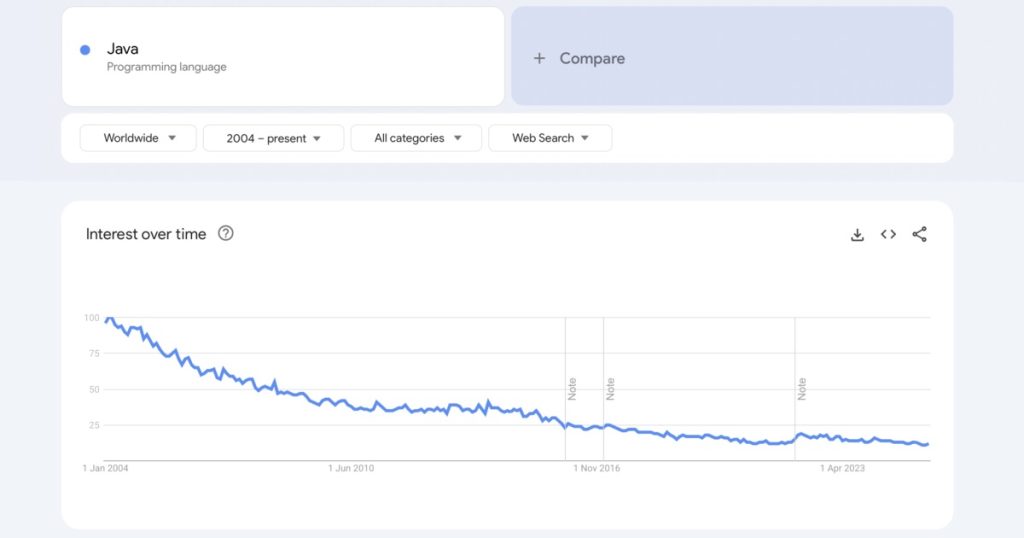July 22, 2025
Last weekend, I visited my brother-in-law’s family. After being enthusiastically greeted by my niece and nephew, they quickly returned to their game on the PlayStation.
“What are you playing?” I asked.
“Minecraft!” they shouted.
If you already know where this is going, you’re ahead of me. But if not, allow me to take you on the same journey of discovery that I have been on only recently.
Wait… Java?
When I was working in investment banking over a decade ago, Java was the language to code in. Almost every trading app I encountered used Java. These days, you’ll more often hear developers talking about Python, Rust, or Go. Borrowing from a previous post and using the tenuous ‘story shaper’ of Google Trends, you might even think Java is slowly fading away:

But that’s the thing about numbers — they don’t tell the whole story.
Beneath the surface of many major technologies, Java is still quietly doing what it’s always done: powering large-scale, indispensable applications. FreeBSD developers I spoke with recently reminded me just how many tools and services still rely on Java today, from Elasticsearch and Tomcat to LibreOffice (which, referring to current news, is at the heart of Denmark’s decision to move away from Microsoft Office).
And yes, Minecraft, the best-selling video game of all time, is written in Java.
Why It Matters
This brings us to the OpenJDK project. You may not see headlines about it every day, but behind the scenes, it’s the backbone of countless systems around the world. That’s why the FreeBSD Foundation has long supported the ongoing maintenance of OpenJDK on FreeBSD — and why this work is so important.
Thanks to the recent excellent work by Harald Eilertsen, OpenJDK on FreeBSD is now fully up to date. His work ensures FreeBSD users, from enterprise to game developers, can rely on Java without compromise.
It’s the kind of work that doesn’t grab headlines — no flashy interface or viral buzz — but it’s the quiet foundation that allows many other projects to thrive.
Full Circle
Back to the living room, watching my niece and nephew shouting with delight, made me think of the work Harald has been doing of late, and of the recent trip to a Hackathon in Berlin. Here was literal joy, in the form of two small humans playing a computer game. A game written in Java, running on a platform developed on top of FreeBSD. Supported by volunteers and professionals who care deeply about keeping essential tools alive and modern.
So the next time someone asks you, “Isn’t Java kind of outdated?” or “Is FreeBSD still a thing?”, think of those two kids. Think of joy, code, and community. Think of the people working behind the scenes to ensure that the foundations of our digital world remain solid.
Outdated? Hardly. Essential? Absolutely.
Contributed by Mark Phillips
